Ballet is more than just a graceful art form; it’s a powerful tool for growth and development. Putting your child in ballet classes in Dallas, TX, offers numerous benefits, from physical health to social skills. Ballet not only helps children stay active but also teaches them discipline and responsibility.
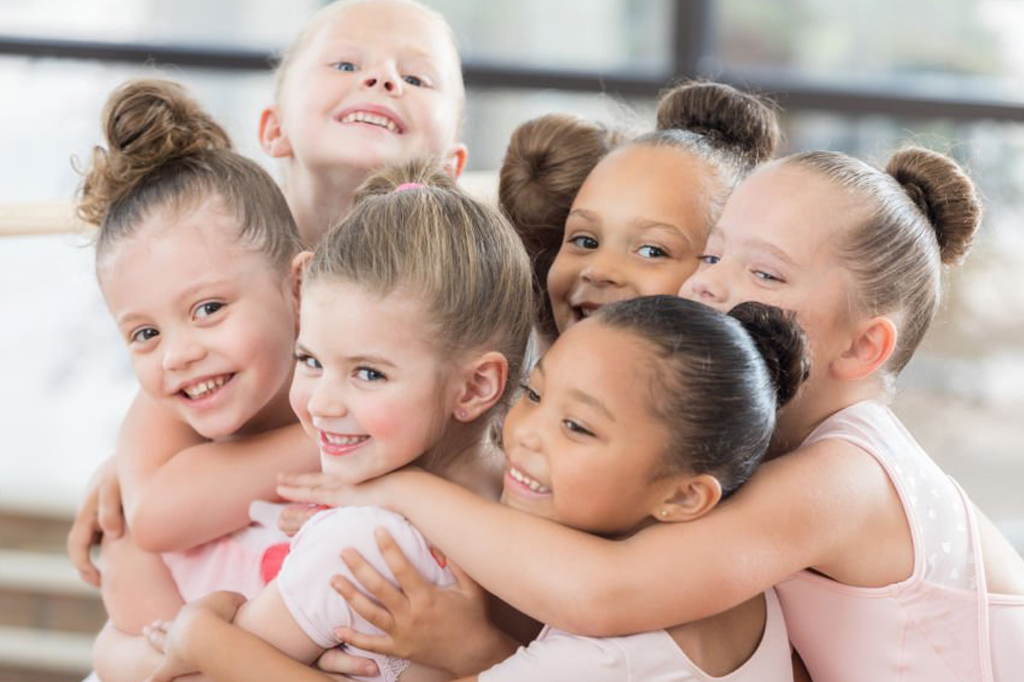
Our city, Dallas, is home to some of the best ballet schools, where experienced instructors guide young dancers. These classes offer a supportive environment for children of all ages and genders to explore their potential. Plus, Dallas has a vibrant arts culture that will inspire your child to appreciate the world of dance and performance.
We believe that introducing your child to ballet can have a lasting positive impact on their lives. Dance classes are not just about learning steps; they are about building a strong foundation for a healthy and fulfilling future. Enroll your child in ballet to help them thrive both on and off the dance floor.
Key Takeaways
- Ballet offers physical, mental, and social benefits for children.
- Most Dallas Ballet Studio has excellent programs with experienced instructors.
- Ballet promotes lifelong skills like discipline and appreciation for the arts.
Physical Benefits of Ballet
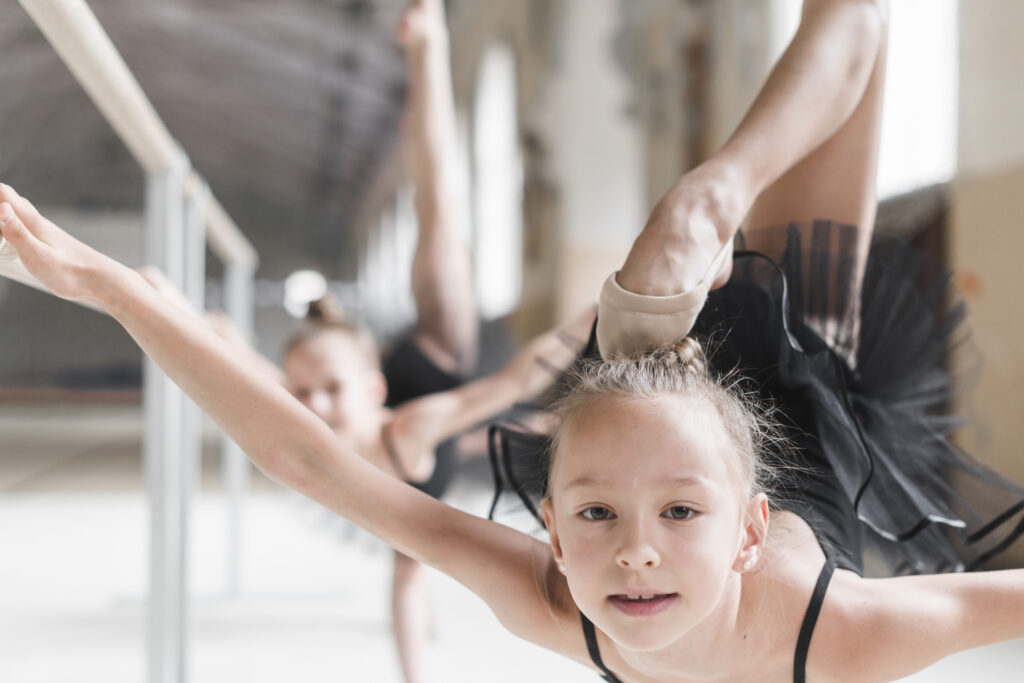
Ballet offers numerous physical benefits for children. It helps them develop flexibility, strength, posture, balance, coordination, and agility.
Enhanced Flexibility and Strength
Ballet stretches and strengthens muscles through various moves. Stretching increases flexibility, which helps prevent injuries. Strength-building exercises, like pliés and relevés, improve muscle tone. Kids learn to use muscles they often wouldn’t in daily activities. By regularly practicing ballet, children gain flexibility and strong core, leg, and arm muscles, setting a foundation for other physical activities.
Improved Posture and Balance
Ballet requires maintaining correct posture and balance during movements. Correct posture is taught from the beginning, helping children develop habits that benefit them throughout their lives. Good posture reduces the risk of back pain and other posture-related issues. Balance is also a key focus, as many ballet moves require precise control of the body. This enhanced balance can help in other sports and activities.
Coordination and Agility Development
Learning ballet helps children improve coordination and agility. Coordination is built through the combination of arm and leg movements, footwork, and body positioning. Agility is enhanced as children practice quick and precise movements. These skills are crucial in ballet and translate well into many other physical activities, providing children with a robust physical foundation.
Cognitive Advantages for Young Minds
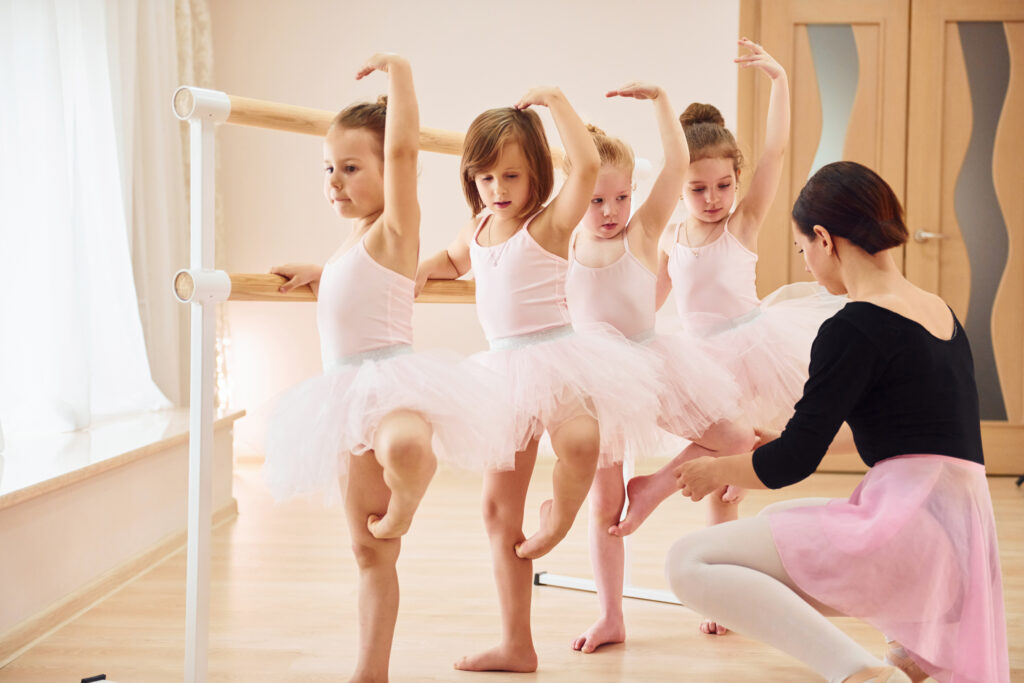
Ballet classes offer numerous cognitive benefits. These advantages include improved concentration, better memory, and enhanced cognitive skills through musicality.
Increased Concentration and Memory
Ballet demands strong focus. In class, children must pay close attention to the teacher’s instructions and remember various dance steps and routines.
This constant mental activity helps to train their minds, making them better at concentrating and retaining information in other areas of their lives too.
Cognitive Skills and Musicality Enhancement
Ballet students often train with music, allowing them to link movements to rhythm and melody. This practice not only improves their musicality but also enhances their spatial awareness and timing.
As children practice, they develop better cognitive skills, including problem-solving and critical thinking. This translates to improved academic performance and creativity.
Social and Emotional Growth
Ballet classes in Dallas, TX offer our children the chance to grow socially and emotionally. Kids learn to work with others, express themselves, and handle performance stress.
Teamwork and Collaboration
In ballet, students often practice and perform in groups. They must learn to move in sync and rely on each other. This teamwork helps build trust and teaches kids how to communicate and cooperate effectively. Being part of a group also fosters a sense of belonging, which is crucial for social development.
Self-Expression and Confidence
Ballet provides a creative outlet for children to express their feelings and ideas. Dancing helps them become more aware of their bodies and emotions. As they improve and master new moves, their self-confidence grows. Performing in front of an audience can also boost their self-esteem and bring a strong sense of accomplishment.
Coping with Performance Anxiety
Performing ballet can be nerve-wracking, but it offers a safe space to deal with anxiety. Children learn techniques to manage their stress, such as deep breathing and visualization. Over time, facing and overcoming their fears of performing builds resilience and prepares them to handle stressful situations in the future.
Cultural Exposure and Artistic Appreciation
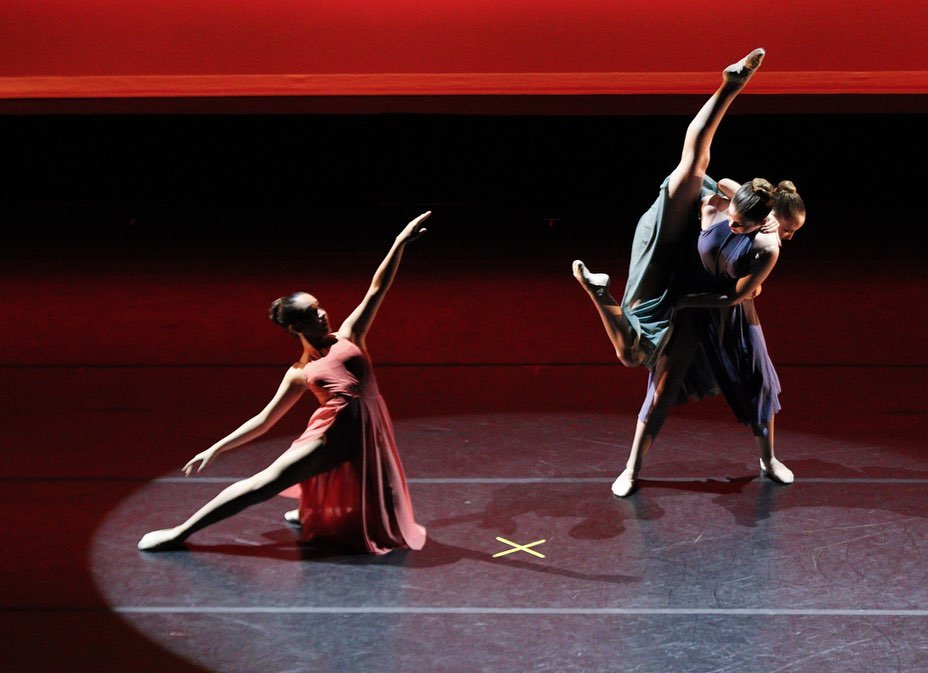
Ballet classes in Dallas offer children a chance to explore classic music and theater, and learn about the history of dance.
Introduction to Classical Music and Theater
When our children join ballet, they are introduced to the world of classical music and theater. Ballet performances often feature famous compositions by composers like Tchaikovsky, Mozart, and Bach. Listening to these pieces helps kids develop an ear for music and an appreciation for musical complexity.
Additionally, ballet productions involve elements of theater such as costumes, sets, and storytelling. Our children learn how music and visuals come together to create a rich, artistic experience. This exposure sparks creativity and a deeper love for the arts.
Understanding of Dance History
Through ballet, our children gain insight into the rich history of dance. They learn about the origins of ballet in the royal courts of France and Italy. Teachers often introduce students to famous figures in ballet, such as Marius Petipa and George Balanchine.
Ballet classes often cover different styles of ballet, from classical to contemporary. This teaches our children how dance has evolved over centuries. By understanding these historical contexts, they can better appreciate the traditions and innovations in today’s performances.
Health and Diet Awareness
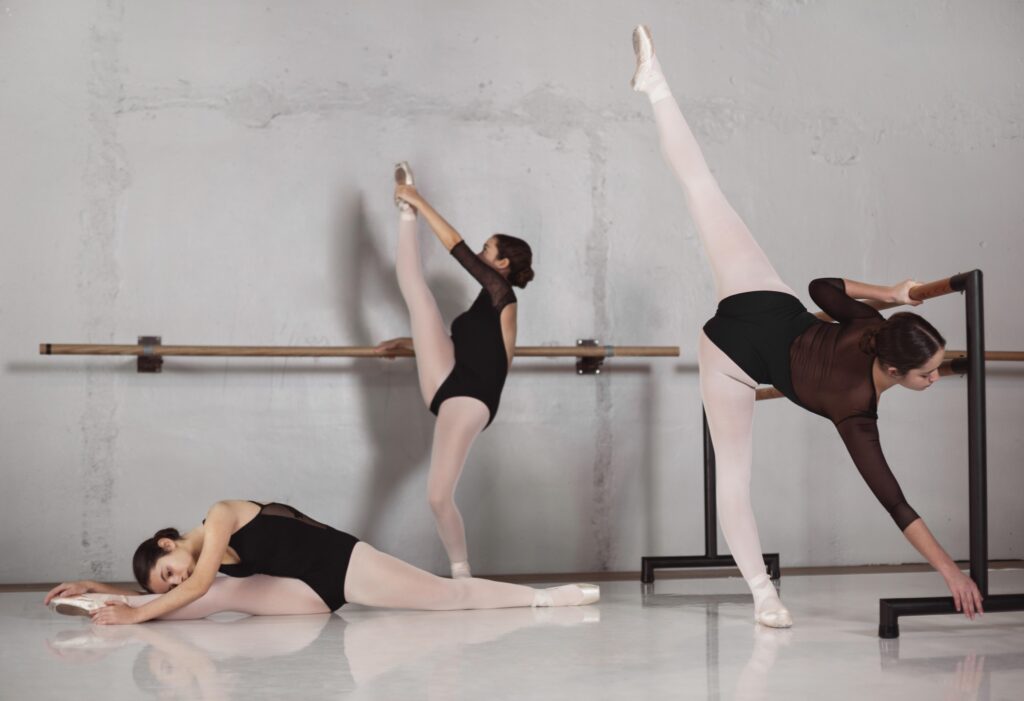
By putting our children in ballet classes, we teach them the importance of good nutrition and a healthy lifestyle. These habits can benefit them not only in dance but in their everyday lives as well.
Importance of Nutrition for Dancers
Nutrition is essential for young dancers. Ballet demands physical endurance and strength. Our children need balanced diets with proteins, carbohydrates, and fats. Proteins help with muscle repair and growth. Carbohydrates provide energy, and fats regulate body temperature and hormones.
Vitamins and minerals are also crucial. Vitamin D and calcium support bone health. Iron boosts energy levels, which is vital during intense practices. As parents, we should encourage our kids to eat fruits, vegetables, and whole grains to meet these nutritional needs.
Hydration is another key factor. Dancers lose water through sweat during practice. Drinking enough water before and after classes prevents dehydration and keeps them performing at their best. Encouraging our children to carry water bottles and take regular water breaks can make a big difference.
Adopting A Healthy Lifestyle Early On
Starting healthy habits early sets a solid foundation. Ballet classes promote regular physical activity. Our children learn about body awareness, posture, and coordination. These skills contribute to overall fitness and prevent injuries.
Sleep is just as important. Young dancers need plenty of rest to recover and grow. Establishing a bedtime routine helps ensure they get enough sleep. We should also emphasize mental well-being. Ballet can be demanding, so supporting our kids emotionally is crucial.
Encouraging our children to balance school, dance, and social activities teaches them time management. It’s important they understand the value of self-care, including relaxation and hobbies outside of dance. Being involved in their routine and supporting healthy choices will benefit them in the long run.
Discipline and Responsibility

Ballet can foster discipline and responsibility in children through structured routines and dedicated practice.
Developing Routine and Time Management
In ballet, children learn to stick to a regular schedule. Ballet classes are held at set times each week, so they get used to managing their time. This helps them balance school, homework, and other activities.
We also see that ballet classes demand punctuality. Students must arrive on time, dressed properly, and ready to start. This teaches them the importance of being prepared and respecting the time of others.
Similarly, children develop routines around their practice. They may need to stretch daily or practice specific moves. These routines help them build habits that can benefit them in various areas of life.
Commitment to Practice and Learning
Children in ballet commit to regular practice. They must learn new moves and routines, requiring dedication and patience. This commitment helps them understand the value of hard work and perseverance.
We notice that regular practice also improves their skills over time. This teaches them that consistent effort can lead to gradual improvement. Seeing their progress motivates them to continue working hard.
Additionally, the discipline needed for ballet translates to other areas. Children become more focused and diligent in their schoolwork and other hobbies. This holistic development is a key benefit of participating in ballet classes.
Ballet Classes in Dallas, TX

Finding the right ballet class in Dallas can make a big difference in your child’s experience. From choosing the perfect school to exploring performance options, Dallas offers various opportunities.
Selecting the Right Ballet School
First, we need to look at the best ballet schools available. Dallas has several reputable ballet schools known for their quality training and experienced instructors. When picking a school, consider the teacher’s qualifications and the class sizes. Smaller classes provide more individual attention for each student.
Another factor is the school’s curriculum. Some schools focus on classical techniques, while others offer a mix of styles. This ensures that our children get a well-rounded dance education. We should also check if the school has age-appropriate classes for all skill levels.
Lastly, we must look for schools that offer a positive environment. This means looking at how the staff interacts with students and the overall atmosphere of the school. A supportive environment helps children stay motivated and enjoy their ballet classes.
Opportunities for Performance and Competition
Performance opportunities allow our children to showcase their skills. Many ballet schools in Dallas offer recitals, showcases, and other performances. This helps build confidence and stage presence. We should look for schools that provide regular opportunities to perform.
Competitions are another great way for children to grow. Many schools participate in local, regional, and national competitions. Competing helps students improve their skills, learn discipline, and gain experience. It’s important to choose a school that supports and encourages participation in competitions.
Both performances and competitions offer valuable learning experiences. They teach our children to work hard, practice regularly, and handle both success and disappointment. These experiences help prepare them for future challenges in dance and beyond.
Conclusion: The Lifelong Impact of Ballet
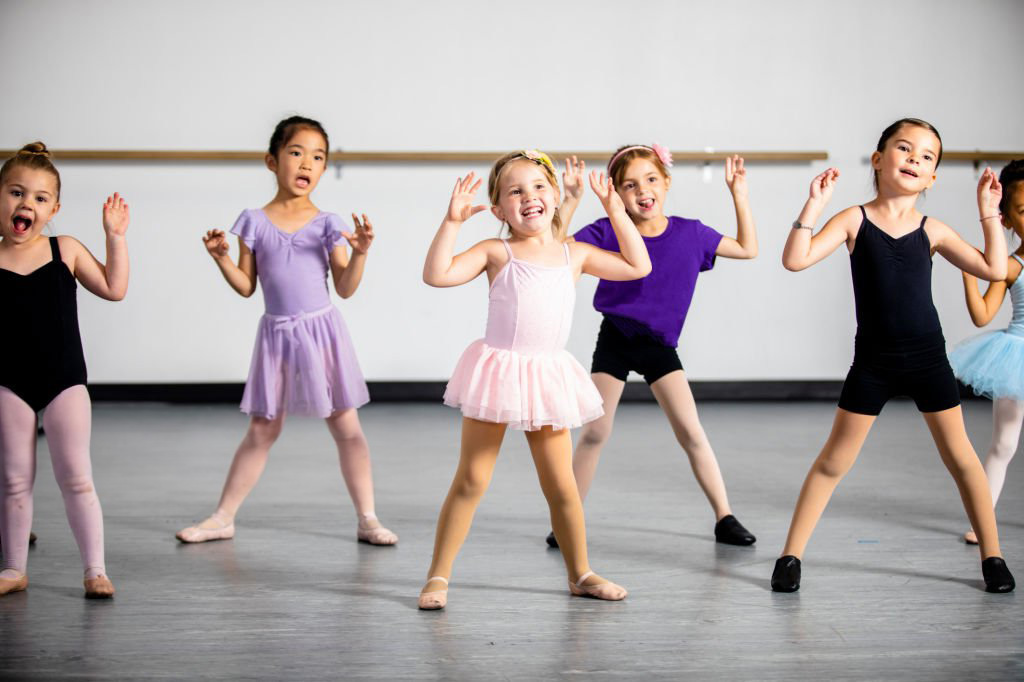
Ballet helps children develop discipline. They learn to practice regularly, and this habit can aid them in their future endeavors.
Flexibility and strength are key benefits. Ballet training enhances both, promoting physical health and well-being.
Ballet is an excellent way for kids to improve posture. This can prevent future back problems and instill confidence in their stance.
Artistic expression through ballet allows kids to communicate non-verbally. It nurtures their creativity and imagination.
Teamwork and social skills are also fostered. Children work together during classes and performances, building lasting friendships.
Cognitive development is another advantage. Learning complex routines helps improve memory and focus.
We notice improvements in emotional health. Ballet offers an emotional outlet, helping children manage stress and anxiety.
Ballet creates a sense of accomplishment. Mastering a new skill boosts self-esteem and encourages a positive outlook.
Cultural appreciation is gained. Children exposed to ballet often develop an appreciation for the arts and different cultures.
Finally, ballet promotes healthy lifestyles. Regular physical activity sets a foundation for lifelong fitness habits.
Frequently Asked Questions
Ballet classes offer many benefits for children in areas like development, discipline, fitness, social skills, and self-expression.
What are the developmental benefits of ballet classes for children?
Ballet enhances fine and gross motor skills. It helps children develop balance and coordination. Ballet encourages creativity as kids learn to express themselves through dance.
How does ballet training influence a child’s discipline and focus?
Ballet classes require consistent practice and learning routines. This helps children develop a strong sense of discipline. The need to follow instructions and pay attention in class improves their focus.
What is the right age to enroll my child in ballet classes?
Children as young as 3 years old can start ballet classes. Early introduction helps with motor skills and coordination. Older kids can also benefit greatly from starting ballet.
Can ballet classes improve my child’s physical fitness and posture?
Ballet is a physical activity that promotes overall fitness. It helps build strength, flexibility, and endurance. Regular practice can improve posture and body alignment.
Are there social benefits for children who participate in ballet?
Ballet classes offer a social environment where children make new friends. Working in groups helps develop teamwork skills. Recitals and performances build a sense of community.
How do ballet classes impact a child’s confidence and self-expression?
Performing in front of others can boost a child’s confidence. Ballet allows kids to express their emotions through movement. This creative outlet can be empowering and satisfying.
Checkout our Dance Classes:
Ballet Classes, Pointe Classes, Hip Hop Classes, Jazz Classes, Tap Classes, Musical Theatre
Visit Us On Social Media!
Royale Ballet Dance Academy
7517 Campbell Rd #400, Dallas, TX 75248
(972) 818-4949
comments +